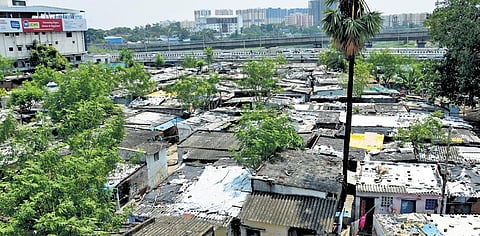Untenable slums in city increased by 91% between 2014 and 2018
CHENNAI: There has been a 63% increase in untenable slums in Chennai, Coimbatore and Madurai between 2014 and 2018. According to the comparative analysis of the data sourced from the Tamil Nadu Urban Habitat Development Board, untenable slums in these three cities increased from 378 to 616, recording an overall increase percentage of 62.9%.
The number of households in untenable slums increased by 65.95 %, from 77,671 to 1,28,893 households in the same period. Chennai with 91.9% recorded the biggest increase in the number of untenable slums.
While tenable slums are located in unobjectionable lands that are environmentally safe and fit for residential use, slums classified as untenable are located in unhealthy environments and may lack basic amenities.
Responding to the analysis, the government said that the figures needed ground study. It also said between 2016 and 2022, 44 slums were cleared and the boundaries were fenced to avoid encroachments. The report also quoted a spatial data analysis to look at the trend of slum growth for locations where slum boundaries and habitation details were available. For instance, from 2005 until May 2021, there was a visible increase in the untenable slum in the marsh area near Velachery and a new untenable slum cropped up after April 2002 in the waterbody area in Kovilambakkam, according to the spatial data analysis.
“Since 2015, nearly 85 ‘objectionable’ slums have been evicted, therefore the number of ‘untenable’ slums should have only decreased. The plan of action should be based on the ‘declaration’ status of the slums as per the Tamil Nadu Areas (Improvement and Clearance) Act, 1971, and not based on recently evolved definitions like ‘objectionable’ or untenable’ introduced by Central government programmes, beyond the purview of this act.
The Housing for All Plan of Action of Chennai as approved in the SLSMC should be made available in the public domain with the list of ‘untenable’ slums along with the methodology and criteria adopted for classifying them, said Vanessa Peter of IRCDUC. “As far as Chennai is concerned, the only way that the number of slums could have gone up is if you include the slums in the expanded areas. If not, there is a concern whether the definition of ‘untenable slums’ has changed which will make more families vulnerable to eviction,” activist R Geetha.

